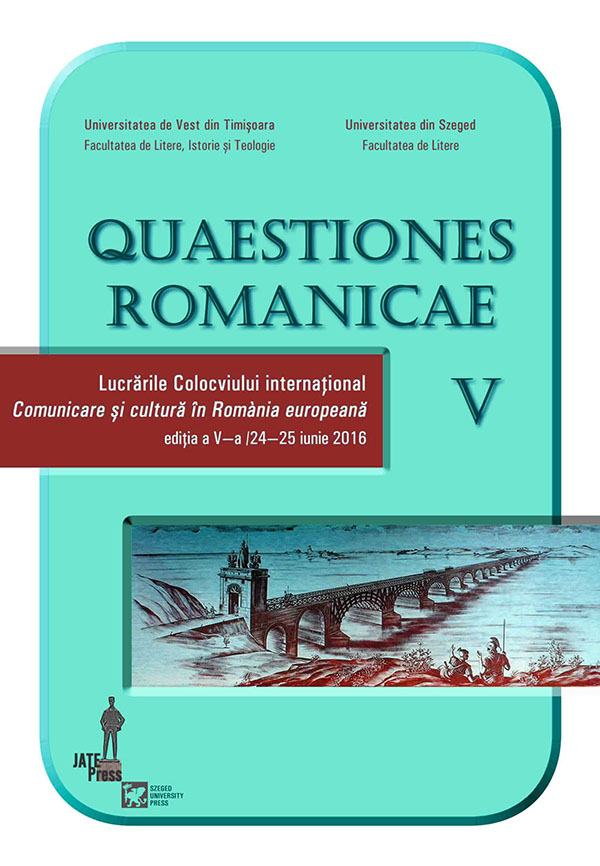Dificultăți privind acordul adjectivelor cromatice compuse în limba română
Abstract: (On the Difficulties Regarding the Agreement of the Romanian Chromatic Compound Adjectives) As far as the flexion of chromatic compound adjectives is concerned, the current Romanian academic works and normative dictionaries do not converge to the same conclusion and, moreover, they increase the uncertainty. For instance, in DOOM2, this type of adjectives are considered being made up of an invariable adjective designating the colour and an adverb that denotes a hue of that colour: (bluză/bluze) galben-închis/roșu-deschis, whereas these words are recorded in the actual pages of the same dictionary as variable adjectives: cf. albastru-deschis, albaștri-deschis, albaștrii-deschis, albastră-deschis, albastredeschis; alb-gălbui, alb-gălbuie, alb-gălbui. This uncertain status of the chromatic compound adjectives is maintained also in GLR 2005, where it is specified that these adjectives are invariable, even though it is suggested that the flexion of the first element would be more appropriate since this is the head of the compound, and the other element is the adverb, an invariable word thus. On the other hand, in DIN there is stipulated the rule according to which the agreement between the chromatic compound adjectives and their determined nouns occurs only on the first word: albastră-închis, albaștri-închis, albastre-închis; verzicrud; galbenă-aprins, galbene-aprins, galbeni-aprins etc. Moreover, in none of these papers, there is no reference to the flexion of chromatic compound adjectives following the structure adjective + noun (like albastru-azur, verde-smarald, galben-lămâie, roșu-sânge etc.), which in other studies in Romance languages (especially in Spanish, French) are considered invariable structures involving an apposition. In this paper, we will try to clarify the agreement issues regarding the Romanian chromatic compound adjectives, by comparing their situation to their status in the other Romance languages but also taking into account the specifics of the Romanian language.
Keywords: grammatical agreement, chromatic compound adjectives, chromatic adjectives, compound adjectives, agreement difficulties.
Rezumat: În privința flexiunii adjectivelor cromatice compuse, lucrările de gramatică și dicționarele normative românești actuale nu doar că nu converg întotdeauna înspre aceeași concluzie, dar sporesc incertitudinea. De exemplu, în DOOM2, acestea sunt considerate drept compuse dintr-un adjectiv invariabil și un adverb exprimând o nuanță: (bluză/bluze) galben-închis/roșu-deschis, pe când în paginile propriu-zise ale dicționarului, acestea sunt înregistrate ca adjective variabile: cf. albastrudeschis, albaștri-deschis, albaștrii-deschis, albastră-deschis, albastre-deschis; alb-gălbui, alb-gălbuie, alb-gălbui. În GLR 2005, situația se menține la fel de incertă, specificându-se că de obicei aceste adjective sunt invariabile, deși se sugerează că normală ar fi flexiunea primului termen, dat fiind faptul că acesta este centrul adjectival al compusului, iar celălalt – adverbul, așadar termen invariabil. Pe de altă parte, în DIN este specificată regula potrivit căreia acordul adjectivelor compuse care desemnează nuanțe sau combinații de culori cu substantivul regent se realizează doar la nivelul primului termen: albastră-închis, albaștri-închis, albastre-închis; verzi-crud; galbenă-aprins, galbene-aprins, galbeniaprins ș.a. În plus, în nicio lucrare de specialitate nu se face referire la flexiunea compuselor adjectivale cromatice cu schema adjectiv + nume precum albastru-azur, verde-smarald, galben-lămâie, roșu-sânge etc., care, în unele studii cu referire la alte limbi romanice (în special spaniolă, franceză), sunt interpretate drept structuri cu apoziție, invariabile. În această lucrare, vom încerca să clarificăm problemele pe care le ridică acordul adjectivelor cromatice compuse, prin comparație cu situația din alte limbi romanice, dar ținând cont și de specificul limbii române.
Cuvinte-cheie: acord gramatical, adjective cromatice compuse, adjective cromatice, adjective compuse, dificultăți de acord.
